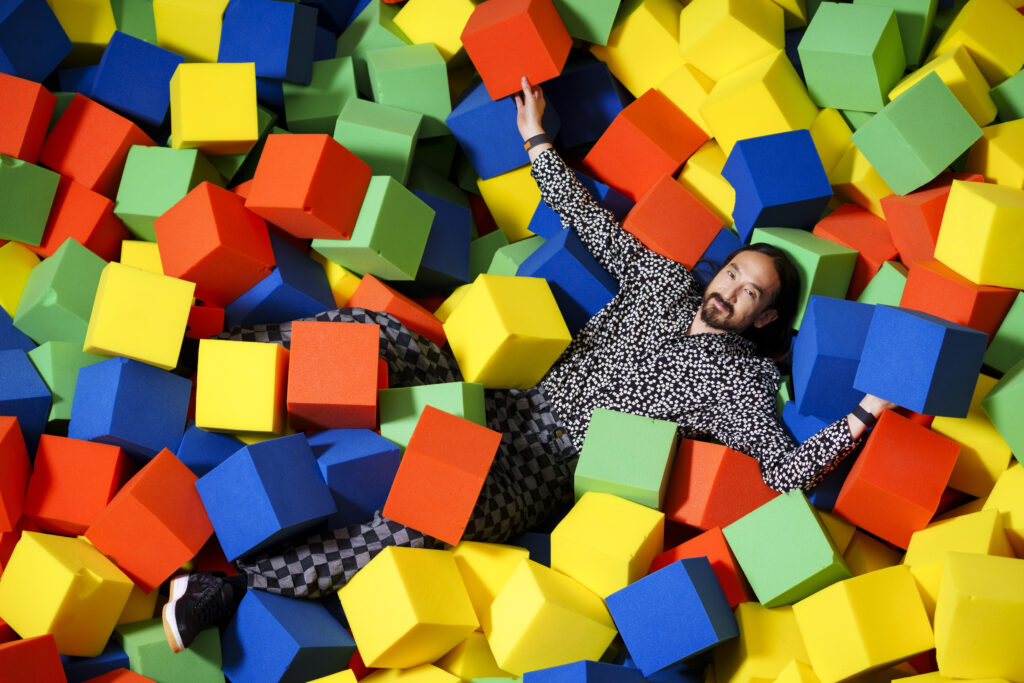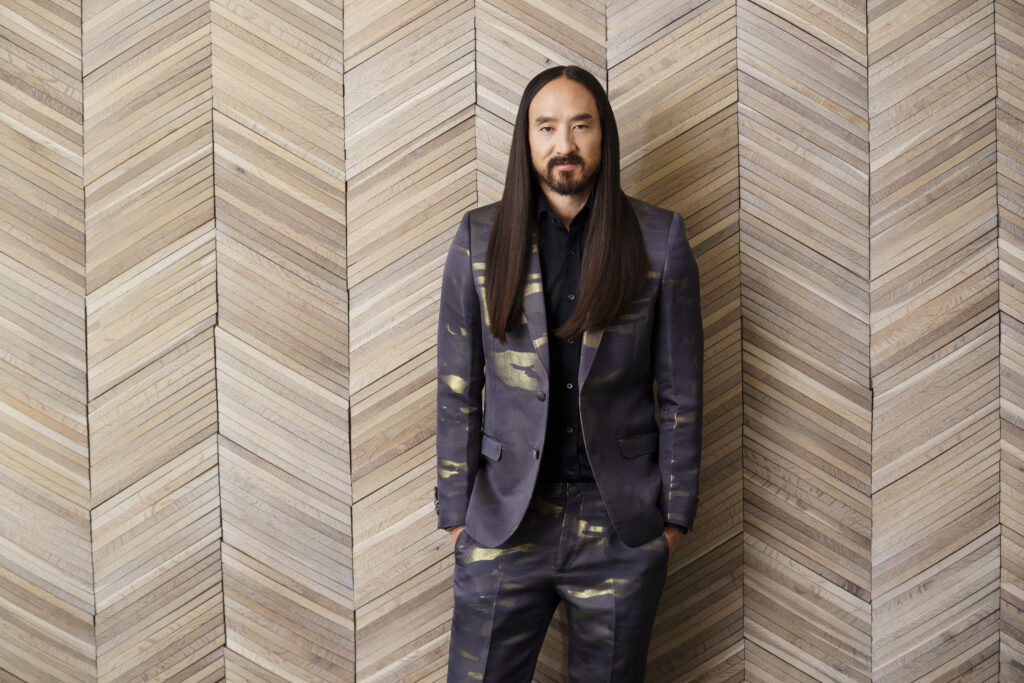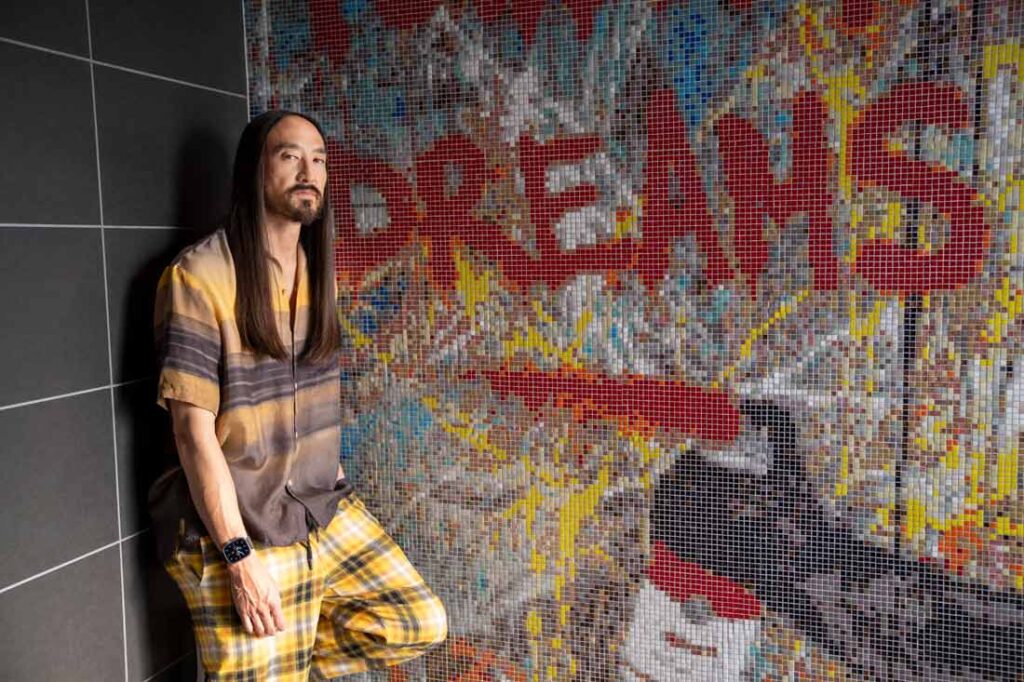A couple of Thanksgivings ago, DJ and entrepreneur Steve Aoki invited 30 people to his house for dinner. But he had a surprise in store for his guests. When 10 p.m. rolled around, Aoki announced, “OK, we’re all done with dinner! Everyone’s going to go do the cold plunge!”
A cold plunge is the act of submerging your body in cold water; it’s said to have certain benefits for both mental and physical health, and Aoki was using his platform to turn it into a trend. He wanted to bring attention to the brain advocacy work that he does with the Aoki Foundation.
Aoki’s face lit up when he told me this story over a Zoom call during his European tour. The science and research that exists at the intersection of humanity and technology has always enchanted him—and it shows through his concept albums (including his newest studio album, HiROQUEST: Double Helix), philanthropy and various side projects.
From biology to the ‘Singularity’
Founded in 2012, the Aoki Foundation raises awareness about brain health and longevity, focusing on new gene therapies, regenerative medicine and organ and tissue engineering and vitality. The foundation’s Neon Future Science program produces one-on-one interviews with Aoki about current breakthroughs and discoveries.
The foundation is funded by the Quantum Fund, whose contributors are often active participants in the conversations produced by the foundation and also meet directly with stakeholders and scientists who are highlighted. According to the organization’s 2022 Form 990, they also funded six grants to organizations that include the Cleveland Clinic Foundation, the University of California, San Francisco Foundation and the Harvard Medical School Foundation.
Aoki didn’t start out planning to create a foundation. When his father, Japanese restaurateur and wrestler Rocky Aoki, died in 2008, Aoki wanted to learn more about the cancer that killed him. He turned to reading to try to find answers.
“I started deep diving on nutrition, on what mutations of cells are, kind of interesting things about the body,” Aoki says. “That led me down this path [of asking how to] repair our body in ways that we could never do before…. The big answer… is technology and science, and that opened this doorway into reading about singularity through Ray Kurzweil.”

Kurzweil is a futurist and inventor (as well as a principal researcher and AI visionary at Google) who predicts that machines will become smarter than humans in our lifetime. The singularity is a hypothetical point in the future where technology has irreversibly grown and changed human civilization forever. Reading Kurzweil’s take on the nonlinear path of humanity and technology has influenced Aoki’s music.
“I express my passions through music,” Aoki says. “So, I made a song called ‘Singularity’ in 2012, and then I asked Ray Kurzweil to be in a cameo for the music video of the story of this guy who dies and comes back to life through technology….
“I wanted to go even one step further and create a whole album,” Aoki says. “I coined this term called ‘Neon Future,’ which is my album series, and I created a whole [intellectual property] around this name, which embraces the intersections of technology and humanity in a way where we’re using technology to literally become superhuman.”
The Aoki Foundation focuses on the brain
But Aoki wanted to take this concept beyond music and support research on things that dive into longevity, particularly the research that centers a deeper understanding of the brain. So, he created his own foundation.
“The Aoki Foundation is all about the brain,” Aoki says. “And how do we access it more? How do we do more with the brain? How do we find ways of longevity and do things that seem like a science fiction approach with a science fact?”
The Aoki Foundation funded research efforts by Ashley Mason, Ph.D., research faculty and integrative clinical psychologist at University of California San Francisco’s Osher Center for Integrative Health. Mason had a hypothesis about the benefit that people receive from saunas; she wanted to see the impact of extreme heat exposure on the brains of people who have depression. The study’s participants were asked to complete self-report measures on depression a week prior to, the week of, and one week after they completed their sauna treatment. Mason’s study found a significant effect in decreased rates of depression after participants’ body temperature was raised to 101.3 degrees Fahrenheit.
This is just one of the studies that the Aoki Foundation has funded. The goal of the foundation is to find research that has a potential to change how the brain works and even find cures for degenerative brain disease.
Steve Aoki’s New Album: HiROQUEST: Double Helix
At the time this story was written, Steve had recently announced the Nov. 17 release of his 8th studio album, HiROQUEST: Double Helix. This album, whose DNA-inspired name gives a nod to Aoki’s preoccupation with human health, is a follow-up to HiROQUEST: Genesis, released in September 2022.
HiROQUEST: Double Helix features collaborations with Akon, Paris Hilton and John Martin. When the first HiROQUEST album was released, the CD came with collectors’ cards and sold quickly, which Aoki credits to the cards. (These will come with the CDs for the new album as well.)
“People are so obsessed with the cards that we sold out of 30,000 CDs in five hours because we put cards inside the CD,” Aoki says. “Some of these cards went for a lot of money. I think one card went for like $1,500 on eBay.”
The HiROQUEST albums are concept albums about a character named Hiro, who is based on Aoki. The dystopian-esque video for the Aoki and Trinix remix of the Akon song “Locked Up” features a claymation Aoki and Akon plotting their escape from a futuristic prison while hackers surrounded by wires manipulate the prison’s cameras with their laptops and send instructions to the fugitives via TV screens.
Alongside the album, Aoki is co-authoring a book with Jim Krueger, who wrote for DC and Marvel, which tells the story of HiRO hinted at in the cards. At the time of writing, there was no release date for the book announced, but Aoki anticipates that it will be released in early 2024.
Music grading and Web3
Aoki is a natural entrepreneur who always has multiple projects going. Recently, he partnered with Collector Archive Services to create the first physical music grading and authentication platform. Like trading card collections, music collections often contain hidden treasures that are highly valuable. Using the same strategies for how trading cards are professionally graded, audiophiles can now submit their vinyl records, cassettes, CDs and 8-track music for grading.
Aoki is also involved in some NFT projects and has a Web3 community called AOK1VERSE, which offers both blockchain and physical experiences, including concert tickets and early access to NFTs that Aoki releases.
“A lot of the time, [community members] come to my shows; they go backstage with me,” Aoki says.
Also, Aoki sometimes collaborates with his fans on AOK1VERSE but has found it harder to do as the community has grown.
“I’ve made a song with three of the members already, two of which are on the album, and those are the highest level of AOK1VERSE: level 6,” Aoki says. “And, within a month of creating AOK1VERSE, people already reached that level. I didn’t expect that…
“When I think of Web3, it’s more about how it gives a voice to people in different ways,” Aoki says. “I’ve been there since the rise of NFT culture and now at the softening of where it’s at, and it’s clear that you need real-world utility.”

Aoki imagines that, eventually, people will be using some sort of blockchain technology to authenticate and build the smart contracts with things that are happening in the real world. This leads to a kind of breakdown in the barrier between blockchain and reality. He already sees a link between blockchain technology and the way that smart contracts are used.
“I’m doing whatever I can to always create the infrastructure for when it will happen in the future and become more [normalized] in regular life—transactions and culture,” he says.
Aoki’s DIY genesis
Aoki has always played with creativity and thematic intersection, and his success is pushed by the willingness to balance a lot of projects and try new things. Aoki credits this to the DIY culture in the punk rock scene, where he got his start long before he became a DJ.
“I dedicated my life to music when I was 14,” Aoki says. “At 14, I found music in this capacity where I was like, ‘OK, I’m not just a passive listener. I am a creator.’”
Aoki learned how to sing and play guitar and drums. Then, he made his first demo. Punk’s DIY culture taught him that he could do anything—and he did. This principle guided Aoki through numerous projects, and he founded Dim Mak Records in 1996, which has signed artists such as Bloc Party and The Gossip.
“There was never this fear of, ‘I can’t do it. I don’t have enough money. I don’t have enough investing. I don’t have people backing it. I don’t have enough branding. I don’t have enough of this.’ Not enough of whatever,” Aoki says. “Because I can just do it and scale as it grows. We’re all living in an age of entrepreneurship already. People already have this understanding that, if you love lamps, you could start your own lamp company with very little investment.”
Making connections
“The best part of DIY is the feeling and the thought that you could do anything that you put your mind to,” Aoki says. “If you want to start a label, you can start a label. You want to do a zine, you can do a zine. You want to be in a band, just be in a band. You might be playing for three people, but you can do it now…. I took that principle with me throughout my entire life.
“When I moved to LA, I was signing rock bands like The Kills and, later, Bloc Party and the Klaxons and bands like that,” Aoki says. “Then, I would remix these bands. In 2005, I remixed Bloc Party because I was DJing in LA in these small, little bars during Dim Mak parties. I transformed from putting on shows in my living room when I was in college to putting on gigs in these bars. Bands would come, and I would DJ with the bands and open up the club.”
As these parties connected Aoki to more artists in LA, he realized that he could remix these songs. He teamed up with some people who taught him how to produce, which led to the release of his first single, “I’m in the House” (featuring Zuper Blahq, the alter ego of will.i.am) in 2009. These connections continued and led to more collaborations.
“LA is where you need to be if you are a musician because, as you grow, it’s easier to make connections with different artists,” says Aoki, who remixed Kid Cudi’s 2009 hit, “Pursuit of Happiness,” and toured with the rapper.
Finding energy in music
Aoki’s lifelong dedication to music makes it easy to understand some of the more intense fandom he has encountered on the road. He admitted that the first tattoo he ever got was a band—although he did not say which band—so he is flattered when people get Aoki or Dim Mak tattoos.
“You know, I get it. Music is an insane thing,” Aoki says. “It makes you do things that you would never do. It’s like love—two things that you can’t understand or control.”
By 2011, Aoki was doing about 300 shows a year and has continued to do so with some breaks for self-care. He tries to maintain a healthy lifestyle and prioritize his own brain health, so he does the heat exposure therapy researched by Mason.
Aoki finds his own energy in music. Acutely aware of how brain functioning affects every aspect of his life, he tries to find energy from “renewable sources” that come from maintaining a healthy lifestyle—although he did admit to drinking coffee and tea. For Aoki, his job is his superlative energy resource.
“I am so lucky and grateful that I have a job that gives me heavy doses of dopamine rushes in a healthy way,” Aoki says. “When I play music to different people around the world, I leave the stage with this high that you can’t explain. It’s truly the greatest high that you can experience because you are just filled with happiness and gratitude. You’re filled with love,” Aoki says.
“These are things I want to experience all the time.”
This article originally appeared in the January/February 2024 issue of SUCCESS Magazine. Photos by Eric Jamison Studio.



